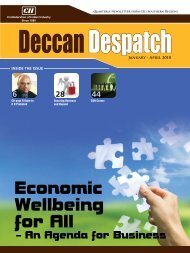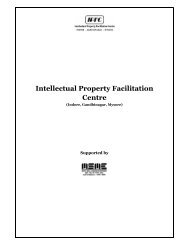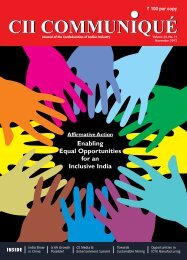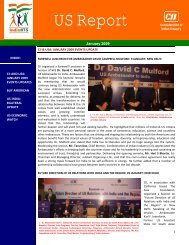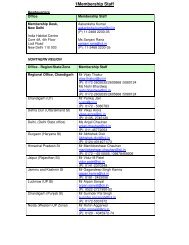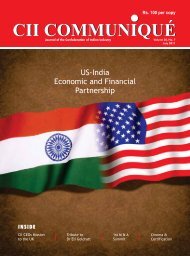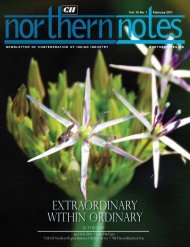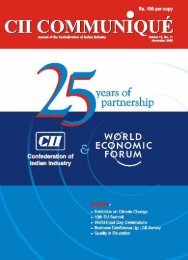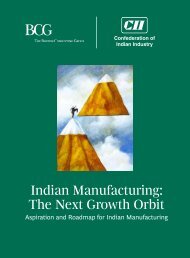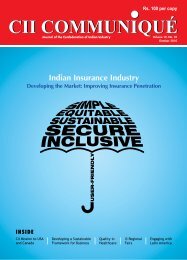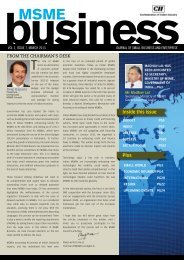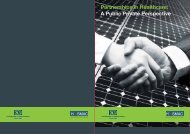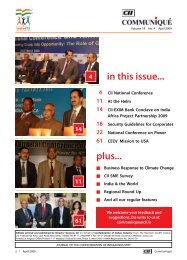CII Communique - February, 2010
CII Communique - February, 2010
CII Communique - February, 2010
You also want an ePaper? Increase the reach of your titles
YUMPU automatically turns print PDFs into web optimized ePapers that Google loves.
spotlight<br />
the economic centre<br />
of gravity is shifting to<br />
Asia – especially China<br />
and India, which will<br />
have ramifications for<br />
the entire world.<br />
At the session on<br />
moving from regional<br />
integration to global<br />
partnerships, chaired<br />
by Mr Michael Yeoh of<br />
the Asian Strategic and<br />
Leadership Institute,<br />
Malaysia, a strong plea<br />
for multilateralism was<br />
made by the speakers. Prof Tarun Khanna, Jorge Paulo<br />
Lemann Professor, Harvard Business School, stressed<br />
that “most trade will happen between the south –south<br />
countries.” Developing nations have to tackle problems of<br />
financial and talent inclusion, Prof Khanna said, pointing<br />
to the need to innovate.<br />
Mr Greg Mills of Brenthurst Foundation, South Africa,<br />
was of the view that African countries, to be able to<br />
successfully integrate with the global economy, will have<br />
to deal with their immense logistical and infrastructure<br />
challenges. Highlighting the need to deal with transaction<br />
costs, he pointed out that it costs more to send goods<br />
within Africa than to send goods from Kenya to China,<br />
and stressed the importance of investing in intra-African<br />
logistical infrastructure.<br />
Ms Patricia Hewitt, MP, UK, and Chair, UK-India Business<br />
Council, noted that big countries like India could<br />
participate effectively in WTO negotiations but small<br />
developing nations could fall out of the multilateral<br />
regime. She made a strong plea for multilateralism,<br />
pitching at the same time for European Union like<br />
barrier-less trade integration. Mr S Pushpanathan, Deputy<br />
Secretary-General, ASEAN, saw no conflict between<br />
the various regional processes and the process of<br />
globalization. The two were interdependent, he said,<br />
pointing to how the global economic recovery was<br />
being led by Asia.<br />
Speakers at the session on Investment Security<br />
emphasized the need for faster and more systemic<br />
policy reforms in India for ensuring greater capital flow<br />
and investment security. Several speakers said that<br />
FDI flows into India were nowhere near what India<br />
needs to finance its infrastructure requirements, despite<br />
considerable progress in creating an investment-friendly<br />
climate.<br />
Mr V Narayanasamy,<br />
Union Minister of<br />
State for Planning,<br />
Parliamentary Affairs<br />
and Culture, India,<br />
i n v i t e d g r e a t e r<br />
investment into India,<br />
saying that private<br />
d e b t a n d e q u i t y<br />
flows into the country<br />
have become more<br />
significant than official<br />
flows. The time has<br />
come for India to make<br />
bold and rapid strides<br />
in economic reforms, he added.<br />
Venu Srinivasan, and Dato’ Krishnan Tan, Chairman, Malaysia India Business<br />
Council, signing the MoU between <strong>CII</strong> and the MIBC<br />
Mr Abdullah Ahmed Al Saleh, Director General, Ministry<br />
of Foreign Trade, UAE, emphasized that technology was<br />
opening up new ways of entrepreneurship, and classical<br />
economies were being swiftly replaced by knowledgeeconomies.<br />
The key to success was the formation of<br />
partnerships between nations that are able to invest<br />
in new technology, like the UAE, and countries with a<br />
skilled workforce, like India. Mr Arvin Boolell, Minister<br />
of Foreign Affairs, Regional Integration and International<br />
Trade, Mauritius, said the WTO July framework in Geneva<br />
should not be unraveled. He added that issues relating<br />
to IPR, fiscal space and agricultural market access<br />
needed to be addressed by the WTO, else developing<br />
countries would suffer.<br />
Tamil Nadu is keen to partner with private investors<br />
in the generation of power, development of sea ports,<br />
Special Economic Zones and townships and is soon<br />
forming a dedicated project facilitation committee, said<br />
Mr Rajeev Ranjan, Principal Secretary, Industries, Tamil<br />
Nadu at the special plenary on the state. A low cost<br />
production base, lower wage rates and availability of<br />
skilled manpower are the key factors that are contributing<br />
to the growth of Tamil Nadu, which has become one<br />
among the fastest growing and largest economies of<br />
India. Mr C K Ranganathan, Chairman, <strong>CII</strong> Tamil Nadu<br />
State Council, said that Tamil Nadu occupies an enviable<br />
position among Indian states in industrial development,<br />
while senior state government officials presented specific<br />
opportunities in the state.<br />
In his keynote address at the Plenary Session on<br />
New Trade Routes, Mr Maqbool Ali Sultan, Minister of<br />
Commerce and Industry, Oman, talked about the need<br />
to complete the Doha Round of negotiations by the end<br />
of this year. He also emphasized the need for systematic<br />
Communiqué <strong>February</strong> <strong>2010</strong> | 19



